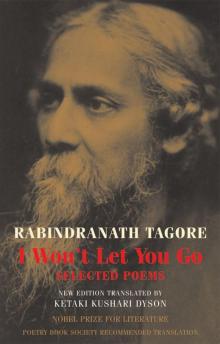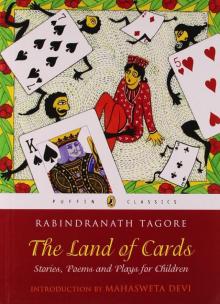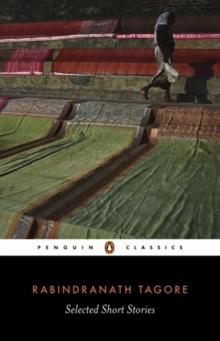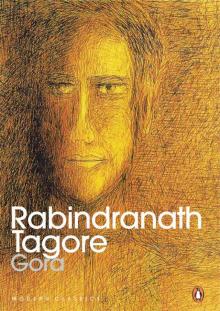- Home
- Rabindranath Tagore
The Boat-wreck Page 5
The Boat-wreck Read online
Page 5
Ramesh prepared to undertake all the arrangements personally and pay for them himself. As he was about to leave, Annada-babu asked, ‘Have you decided where to practise law after the wedding? Will it not be in Calcutta?’
Ramesh said, ‘No, I am in search of a suitable place in the provinces.’
‘Splendid idea. Etawah is not a bad place. The water is excellent for digestion – I spent a month or so there – my appetite had doubled. Look, I have just the one daughter in the whole wide world – if I do not live with her, she will not be happy and I will not be content. So it is my wish that you choose a healthy place to live in.’
Taking advantage of Ramesh’s unjust decision, Annada-babu proceeded to state his demands. Even if he had wanted to move to Garo or Cherrapunji and not Etawah, Ramesh would have agreed at once. Saying, ‘As you wish, I shall practise in Etawah,’ he left to organize the withdrawal of the wedding invitations.
A little later, Akshay arrived. Annada-babu told him, ‘Ramesh has postponed the wedding by a week.’
‘No, this is impossible. How can he do that? The wedding is day after tomorrow.’
‘It certainly should have been impossible – people don’t usually do things like this. But considering the ways of your generation, everything seems possible.’
Akshay appeared to ponder over the situation with an exaggeratedly grave expression.
After a while, he said, ‘You are blind towards the person you have chosen as a suitable boy. You should make enquiries about someone you are about to entrust your daughter to for life. He might be a god descended from heaven but you can never be too careful.’
‘If one has to be suspicious about someone like Ramesh, it’s impossible to maintain a relationship with anyone in the world.’
‘Has Ramesh-babu explained why he wants to postpone the wedding?’
Running his fingers across his pate, Annada-babu said, ‘No, he gave no reason. When I asked, he said he has something important to attend to.’
Akshay looked away and smiled. Then he said, ‘Maybe he has spoken to your daughter.’
‘That’s possible.’
‘Why not ask her?’
‘You’re right,’ said Annada-babu and called out to Hemnalini. When she saw Akshay in the room, she walked over quickly to stand next to her father, averting his eyes.
‘Did Ramesh tell you why he suddenly wanted the wedding postponed?’ Annada-babu asked.
‘No,’ answered Hemnalini, shaking her head.
‘Didn’t you ask?’
‘No.’
‘How strange. You’re as bad as Ramesh. He says, “I don’t have time to get married.” And you say, “Very well, we’ll get married some other day.” Nothing more to discuss.’
Taking Hemnalini’s side, Akshay said, ‘Why ask questions when a person is clearly hiding something? Ramesh-babu would have come forth on his own had he wanted to reveal the truth.’
Hemnalini reddened. ‘I do not wish to hear outsiders talk about this,’ she said. ‘I have no cause for complaint.’
She left the room.
Summoning a smile to his ashen face, Akshay said, ‘The job of a friend attracts the greatest humiliation on earth. That is why I feel the glory of friendship strongly. Even if you detest me or abuse me, I consider it the duty of a friend to mistrust Ramesh. I cannot rest when I sense danger for any of you. I have to admit that this is a failing on my part. Anyhow, Jogen will be here tomorrow – if he, too, is confident about this wedding after examining all the facts, I shall say nothing more.’
It was not as though Annada-babu had not realized that Ramesh’s behaviour should be questioned. But, quite naturally, he felt no enthusiasm about stirring an invisible hornet’s nest and creating a storm of controversy. ‘You are too suspicious, Akshay,’ he said angrily. ‘Even without any proof why must you…’
Akshay knew the art of self-restraint, but his patience snapped at these continuous attacks. ‘Look, Annada-babu, I have many flaws. I am envious of a suitable groom for your daughter; I do not trust honest people. I am not learned enough to teach a gentleman’s daughter philosophy, nor do I have the audacity to discuss poetry with them. I am one of the masses. But I have always been attached to your family, I am devoted to you. You cannot compare me to Ramesh-babu in any way whatsoever – but I do pride myself on not hiding anything from any of you. I am ready to reveal all my weaknesses and seek your charity, but it is not in my nature to steal by night. Tomorrow you shall understand what I mean.’
16
It was late at night by the time all the letters were distributed. Ramesh went to bed, but he could not sleep. Like two rivers, two streams of thought – one white, one black – flowed through his mind, the sound of their combined roaring disturbing his hours of repose.
Tossing and turning for a long time, he finally got out of bed. Standing by the window, he saw the houses casting shadows on one side of the deserted lane, while the moon threw a white line on the other.
Ramesh stood in silence. His soul melted into all that held fast, all that was tranquil, all that encompassed the world, all that held no conflict or doubt, becoming one with them. This was a soundless, limitless realm from which birth and death, work and rest, beginnings and endings, all entered the stage of the world to the exquisite rhythm of an unheard music. In this world that lay beyond light and darkness, Ramesh observed love between man and woman appear on the starlit earth.
Climbing on to the roof, Ramesh glanced at Annada-babu’s house. Silence everywhere. The moonlight and the shadows had drawn strange lines on the walls, beneath the parapet, between the folds of the doors and windows, on the base of the building with flaking paint.
It was a miracle that existed in the form of a woman within this nondescript home in this densely populated city. There were countless students, countless lawyers, countless residents and visitors in this capital city – of all of these people it was an ordinary person like Ramesh who had stood next to a young woman by a window in the yellow autumn sunshine and seen life and the world bathed in an infinite, joyous mystery. What a miracle this was! Such enchantment within the heart and such magic outside it.
Ramesh paced across the rooftop late into the night. Gradually the crescent moon sank behind the building in front him. The darkness of the night deepened on the surface of the earth, but still the sky glowed faintly in the embrace of the departing light.
An exhausted Ramesh shivered in the chill. A sudden anxiety took hold of his heart. He remembered that he would have to resume his fight on the battlefield of life tomorrow. Although there was not a crease of worry in the sky, no upheaval of tortuous effort in the moonlight, although the night was calm and silent, there was no respite from conflicts between individuals, for all of human society was in turmoil from its joys and sorrows, its obstacles and hindrances. Even in his disquiet, Ramesh wondered how the tranquillity of eternity and earthly struggles could coexist. A short while ago he had seen everlasting love, serene and self-contained, at the heart of the universe, but the very next moment it appeared to be turning sullen, thwarted at every step by the bruising onslaught of existence, by the complexity of life. Which of these was the truth, and which, an illusion?
17
Jogendra returned from his travels on the morning train. It was Saturday, Hemnalini was to have been married the next day. But as he approached his home, Jogendra got no whiff of celebrations. He had imagined that the decorations for the wedding would have been visible by now – but the house was no different from its neighbours when it came to looking disfigured and ugly.
Was someone ill? Entering, he found breakfast laid out on the table, and Annada-babu reading the newspaper with a half-drunk cup of tea in front of him.
‘How is Hem?’ asked Jogen.
‘Very well,’ replied Annada-babu.
‘What about the wedding?’
‘Next Sunday.’
‘Why not tomorrow?’
‘Ask your friend. All that Ramesh has tol
d us is that he has some urgent business to attend to and the wedding cannot take place this Sunday.’
Jogendra was irked with his inept father. ‘Things go wrong whenever I’m not here, Baba,’ he said. ‘What business can Ramesh have to attend to? He lives independently and has no family to speak of. If he is in financial trouble, I see nothing coming in the way of his disclosing it. Why did you let him go so easily?’
‘He hasn’t run away – why don’t you find out for yourself?’
Draining a cup of hot tea, Jogendra went out at once.
Annada-babu said, ‘What’s the hurry, Jogen? You haven’t even eaten.’
His remonstrations fell on deaf ears. Entering Ramesh’s house, Jogen stomped up the stairs noisily. ‘Ramesh! Ramesh!’ No response. Searching all over, he found Ramesh neither in the bedroom or drawing room, nor downstairs or on the roof. After much shouting, he located Ramesh’s servant and asked, ‘Where’s Ramesh-babu?’
‘He went out early this morning,’ answered the servant.
‘When will he be back?’
The servant said that his master had packed some clothes before leaving, telling him that he might not be back for four or five days. The servant did not know where he had gone.
Jogendra returned home, looking grim. ‘What’s the matter?’ asked Annada-babu.
An annoyed Jogendra replied, ‘The matter is that here is a man to whom you will give your daughter in marriage next week – and none of you know what his urgent business is or where he is now. And yet, he lives next door.’
Annada-babu said, ‘But he was there last night.’
Jogendra said in agitation, ‘You don’t know where he goes, his servant doesn’t know where he’s gone, what sort of hide- and-seek is this? I don’t like the look of this, Baba. How can you be so indifferent?’
Annada-babu started to feel worried after this rebuke. Gravely he said, ‘That is true, what’s all this?’
A thoughtless Ramesh could easily have bid goodbye to Annada-babu last night. But it had not even occurred to him. He was under the impression that the phrase ‘urgent business’ had summarized everything that he needed to disclose. Concluding that he had secured all the permission he needed, he had set forth on his troublesome mission.
Jogendra then asked, ‘Where’s Hemnalini?’
‘She had her tea early and has gone upstairs.’
Jogendra said, ‘Perhaps the poor girl is avoiding me out of embarrassment at Ramesh’s inexplicable behaviour.’
He went upstairs to console a diffident and hurt Hemnalini. She was sitting quietly on the bed. At the sound of her brother’s footsteps she drew a book to herself quickly, pretending to read it. When Jogendra entered, she laid the book down and stood up with a smile. ‘Here you are, Dada. You don’t look well.’
Jogendra sat down on the bed, saying, ‘I have no reason to. I’ve heard everything, Hem. But don’t worry. It’s because I wasn’t here that all this confusion ensued. I will settle everything. Didn’t Ramesh give you a reason, Hem?’
Hemnalini was in a quandary. Airing suspicions about Ramesh’s motives had become intolerable to her. She did not wish to tell Jogendra that Ramesh had offered no reason for postponing the wedding, and yet it was impossible for her to lie. Hemnalini said, ‘He was prepared to tell me, but I did not consider it necessary.’
Jogendra interpreted this as justifiable hurt on Hemnalini’s part. He said, ‘Very well, don’t worry, I shall find out the reason today.’
Leafing through her book perfunctorily, Hemnalini said, ‘I am not worried, Dada. I do not want you to implore him for the reason.’
Jogendra considered this a statement of pique. ‘All right, don’t worry about all this,’ he said, and made to leave.
Jumping to her feet, Hemnalini said, ‘No, Dada, you must not bring the subject up with him. No matter what you think of him, I have no doubts at all.’
Suddenly it occurred to Jogendra that this did not sound like indignation. He smiled with affectionate compassion. These people have no idea about the ways of the world, he told himself. They had studied a great deal, they followed the news, but they did not have sufficient experience to determine when it was necessary to be suspicious. Contrasting his sister’s implicit trust with Ramesh’s duplicitous behaviour made Jogendra even angrier with Ramesh. He became all the more determined to find out the reason. As he made to leave again, Hemnalini gripped his arm, saying, ‘Promise not to bring this up with him, Dada.’
‘We’ll see,’ said Jogendra.
‘No, Dada, we shan’t see. You must give me your word. I am assuring you that there is no cause for concern. Keep my request this one time.’
Hemnalini’s resoluteness led Jogendra to believe that Ramesh must have told her everything, but it wasn’t difficult to persuade Hem. ‘It’s not a question of mistrust, Hem,’ he said. ‘But a girl’s guardians must perform their duty. If there is an understanding between the two of you, that might be good enough for you – but not for us. We must come to an understanding with him too. To tell the truth, Hem, we have to come to an understanding more than you do – we will not have much to say once you are married.’
Jogendra hurried out. The intimacy, the seclusion that love seeks no longer remained. The relationship between Hemnalini and Ramesh, which should have brought them closer to each other and made them belong to one another, was now under repeated attack from the harsh suspicions of other people. Hemnalini was so wounded by this that she was hesitant to meet even her friends and family. She kept sitting quietly on the bed after Jogendra had left.
Akshay appeared soon afterwards, saying, ‘Here you are, Jogen. Have you heard everything? What do you think?’
‘I have many thoughts, but there is no point debating my assumptions. This is no time to discuss the subtleties of psychology over a cup of tea,’ said Jogendra.
‘You know very well discussing subtleties is not my forté, whether it’s psychology or philosophy or poetry. I understand practical issues – which is what I am here to discuss with you.’
Jogendra said impatiently, ‘All right, we’ll talk about practical issues later. For now, can you tell me where Ramesh is?’
‘I can,’ answered Akshay.
‘Where is he?’ asked Jogendra.
‘I shan’t tell you now,’ said Akshay, ‘but I shall bring you face to face with him at three o’clock today.’
‘What’s going on?’ said Jogendra. ‘All of you are turning into enigmas. How mysterious the world has become in just the few days that I’ve been away. No, Akshay, you must not be so secretive.’
‘I’m happy to hear that. It is because I haven’t been secretive that your sister no longer wishes to see me, that your father berates me for being a suspicion-monger, and Ramesh-babu is not exactly overcome with joy when he sees me. That leaves you. I am afraid of you – you do not care to discuss the finer points, you find it easier to do things with broad strokes. I am vulnerable, I won’t survive your attack.’
‘Look, Akshay, I don’t understand your twisted statements. I can understand clearly you have something to tell me – why must you hold it back to negotiate a higher price? Tell me simply, let’s be done with it.’
‘Very well, let me tell you everything from the beginning – there is much that you do not know.’
18
The lease for the house Ramesh had occupied at Darjipara had not run out, and he had not had the time to consider renting it to someone else. He had disappeared from that world these past few months, without considering his personal profit or loss.
This morning he had had the house cleaned, the bed made, and made arrangements for meals. He would have to bring Kamala here when the school closed for the holidays.
There was still some time to go. Meanwhile, Ramesh lay back on the bed, considering the future. He had never been to Etawah, but it was not difficult to imagine. His house was on the edge of the city – a wide, tree-shaded avenue ran past it. Across the road lay an enormous fi
eld, interspersed with wells and scaffolding to keep away animals and birds. Cows were being used to draw water to irrigate the farms, the plaintive sounds of the mechanism audible all afternoon. Horse-drawn carriages passed by occasionally, raising clouds of dust, their rattling awakening the dazzling sky from its stupor. It would be painful to imagine Hemnalini alone all day far away from home amidst the heat of this place, its indifferent afternoons, and its loneliness. Picturing Kamala as a companion and friend to her gave him some comfort.
Ramesh had decided to tell Kamala nothing as of now. After the wedding, he would draw Hemnalini to his breast and tell her Kamala’s true story slowly, with love and compassion, unravelling the mystery with as little pain as possible for the listener. Then, there in that distant land, outside a society that knew them, Kamala would become one of them easily, without suffering.
The afternoon lane outside was silent. Those who went to work had left, and those who did not were preparing for their siesta. The temperate October afternoon had turned pleasant – the joy of the coming holidays had already streaked the sky with happiness. There in that deserted house Ramesh went on inflating his images of contentment.
Suddenly the sound of a heavy carriage was heard. It stopped outside the door of Ramesh’s house. He realized that the school had sent Kamala in its carriage. He grew anxious – what would Kamala be like now? What would they talk about? How, for that matter, would she behave with him? These questions troubled him.
Two of Ramesh’s servants were downstairs – they brought Kamala’s trunk upstairs and put it down in the veranda. Kamala followed them, stopping at the door to the room instead of entering.
‘Come in, Kamala,’ said Ramesh.
Overcoming her inhibition, Kamala entered. Ramesh had wanted her to stay at the hostel during the holidays, but she had cried her heart out and forced him to allow her to come home. This incident and the months of separation seemed to have created some distance between her and Ramesh. So, on entering the room, Kamala turned her face away and looked out through the open door.

 Selected Poems
Selected Poems The Lover of God
The Lover of God I Won't Let You Go: Selected Poems
I Won't Let You Go: Selected Poems The Land of Cards: Stories, Poems, and Plays for Children
The Land of Cards: Stories, Poems, and Plays for Children The Tagore Omnibus, Volume One
The Tagore Omnibus, Volume One The Boat-wreck
The Boat-wreck Chokher Bali
Chokher Bali Selected Short Stories
Selected Short Stories He (Shey)
He (Shey) Letters From a Young Poet 1887 1895
Letters From a Young Poet 1887 1895 Gora
Gora Tagore Omnibus, Volume 1
Tagore Omnibus, Volume 1 Selected Poems (Tagore, Rabindranath)
Selected Poems (Tagore, Rabindranath)